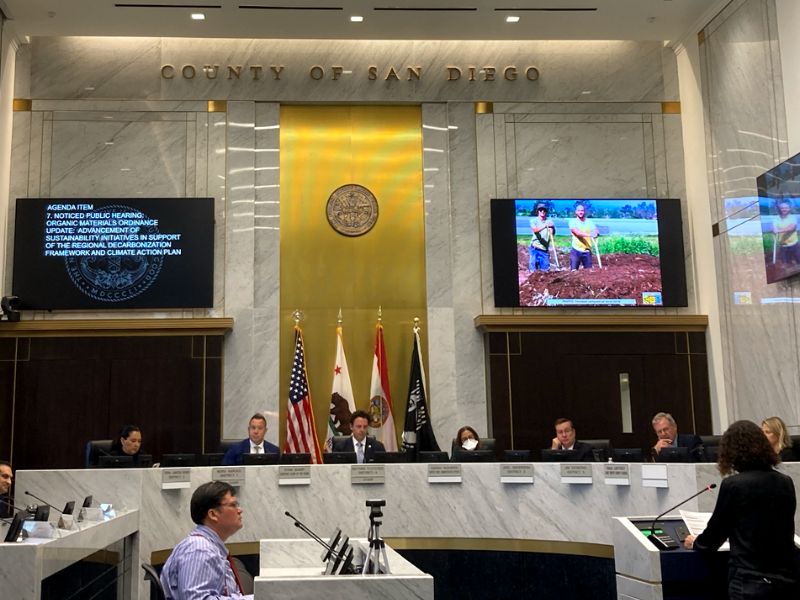San Diego County unanimously passes ordinance in support of organic waste processing!

Celebrations are in order! The San Diego County Board of Supervisors just passed an updated ordinance that will amend the County’s existing zoning ordinance and allow organic material composting to occur in more areas of the unincorporated county. This will have a significant impact in the years to come on San Diego County’s ability to process organic waste (food scraps, yard trimmings, etc.) and uphold the regulations set down in SB 1383 in early 2022.
For those of you who have been following the updates on this journey, you know we worked to get this issue in front of the Board of Supervisors and helped pass the ordinance through onsite demonstrations and piloted projects that proved how passing it would be the best option for the County of San Diego. For decades, Solana Center has been educating the San Diego community about the very real climate impact of organic material in landfills, which creates methane and nitrous oxide, greenhouse gases (GHG) 80 times more potent than carbon dioxide. To this end, we also work with local food businesses, including grocery stores and restaurants, to help them properly recycle organic material, reduce food waste, donate edible food, and create more environmentally-friendly business practices. All of the groundwork and education our organization has been laying will be even more important now that this ordinance has been passed.
Below is a reaction statement from Jessica Toth, Solana Center’s executive director.
“We applaud the San Diego County Board of Supervisors for tackling this important issue by passing this ordinance that will update how San Diego County processes organic waste. Our region only has the capacity to properly manage one-third of the total organic material we generate, using commercial composting and anaerobic digester facilities. This ordinance will encourage additional decentralized composting, creating a regional closed loop system to replace today’s linear infrastructure.
“While SB 1383, California’s new organic waste law, paves the way for us to fight climate change effectively by properly recycling organic material, we needed local action in San Diego to promote the creation of additional processing capacity. Right now, most of our organic waste is sent out of the area for processing, while local farmers and community gardeners use synthetic soil supplements or finished compost and fertilizer from elsewhere. Allowing more land in unincorporated areas of our county to be used for composting will create a “farm to table to farm” loop that is so much better for the environment and will help us meaningfully fight the harmful effects of climate change.
“Now that this ordinance has been passed, it is an excellent step forward—but in order to make it effective, the County is going to need to do outreach to raise awareness about the ordinance and provide proper training and education about composting. Solana Center is eager to partner with the County on this effort, as we currently provide the training needed for farms and community gardens to do their own composting onsite, as well as educational workshops that teach everyday citizens how to compost.”
Pictured above: Jessica Toth, Solana Center Executive Director, presenting to the San Diego County Board of Supervisors in support of the ordinance.
